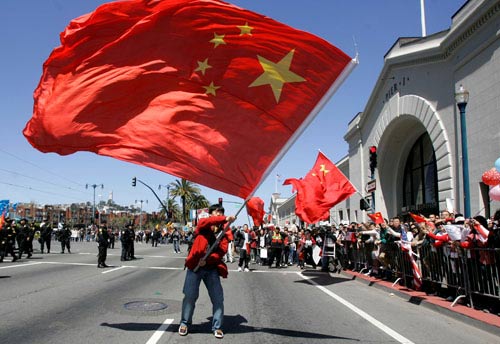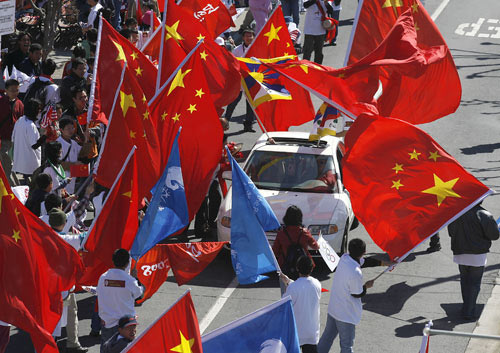Confusion along San Francisco Olympic torch route By Adam Tanner
41 minutes ago
SAN FRANCISCO (Reuters) - Confusion surrounded the relay of the troubled Olympic torch through San Francisco on Wednesday, as organizers completely changed the route at the last minute, bewildering thousands of China supporters and protesters converged along the planned route.
The first runner held the torch aloft and began the route, flanked by tall, blue-clad Chinese security officials.
But the group then promptly disappeared into a large waterfront warehouse for a last-minute change of route by authorities to head off trouble.
What Chinese Olympic organizers have called a "Journey of Harmony," quickly became the mystery of the missing flame on the only relay leg of the torch in the United States on its journey to the Beijing Olympic Games in August.
The torch was a magnet for chaotic demonstrations in London and Paris in the last week over a range of China issues from China's crackdown on Tibet last month to human rights. Beijing, embarrassed as it prepares to host the Olympics, has strongly condemned the protests.
After the torch disappeared from view in San Francisco, police boats and jet skis nearby hinted it might be headed up the waterfront by boat.
But then after a delay of an hour, it appeared on a major north-south street more than two miles away.
Spectators were bewildered.
"I think it's cowardly. If they can't run the torch through the city, it means that no one is supporting the games," said Matt Helmenstine, 30, a California high school teacher who had a Tibetan flag.
Michael Huo, 30, a Chinese engineer working at a Silicon Valley company, added: "I think we were cheated, because I think the meaning of the rely was to show the whole world that our country is hosting the Olympics."
San Francisco is a city with a large Chinese-American population and many had waited proudly to see the torch relay. But there tense confrontations with anti-China protesters.
At least one pro-Tibetan demonstrator was detained even before the starting event, which began later than the scheduled 1 p.m. (2000 GMT).
TENSIONS IN THE CITY
In front of the city's ferry building, Christine Lias, 30, was quickly surrounded by more than 30 Chinese-Americans after she said "Free Tibet now!"
"Liar, liar, shame on you," many in the group shouted.
On a beautiful spring day, San Francisco deployed hundreds of security officers, including agents from the FBI, backed by police cars with flashing lights, harbor boats, jet skis and helicopters.
Police warned anyone crossing barricades would be subject to arrest.
Thousands of pro-China spectators gathered along the original planned route, many flying the five-star Communist Chinese flag alongside U.S. and Olympic flags.
"In 5,000 years of Olympic history the Chinese can finally have one time hosting the Olympics. It means that China is becoming a world power," said Don Zheng, 41, a Chinese-American computer engineer who emigrated in 1988.
Many Chinese-Americans are proud that their ancestral home is hosting the global sporting event and resent the protests.
"I'm loyal to the U.S. but I love China because it's my motherland," said Alice Liu, 50, who came to the United States after the 1989 Tiananmen Square protests.
Scott Bennett, 54, a Buddhist from San Mateo, California, who was carrying a Tibetan flag, was quickly confronted by supporters of the torch relay.
The torch relays have also attracted other groups unhappy about a range of China-related issues, including its human rights record and policies on Sudan's Darfur region. Critics say China should use more of its clout with Sudan to ease the bloody conflict in Darfur.
China blames Tibet's spiritual leader, the Dalai Lama, and his associates for orchestrating monk-led protests in Tibet last month as part of a campaign for independence. The Dalai Lama denies this.
BUSH CALL
Hours before the San Francisco torch relay, President George W. Bush urged China to open a dialogue with the Dalai Lama. He said he agreed at a meeting with Singapore Senior Minister Goh Chok Tong "that it would stand the Chinese government in good stead if they would begin a dialogue with the representatives of the Dalai Lama."
Western leaders are facing a delicate balancing act as calls mount for them to boycott the Olympics opening ceremony.
Olympics chief Jacques Rogge told the Wall Street Journal that reports the International Olympic Committee executive board would consider scrapping the torch relay outside China, to avoid more ugly scenes, were "based on a misunderstanding."
The torch protests have stirred up patriotic resentment among many ordinary Chinese who feel they politicize a sporting event that should be a celebration of 30 years of economic development and opening to the outside world.


